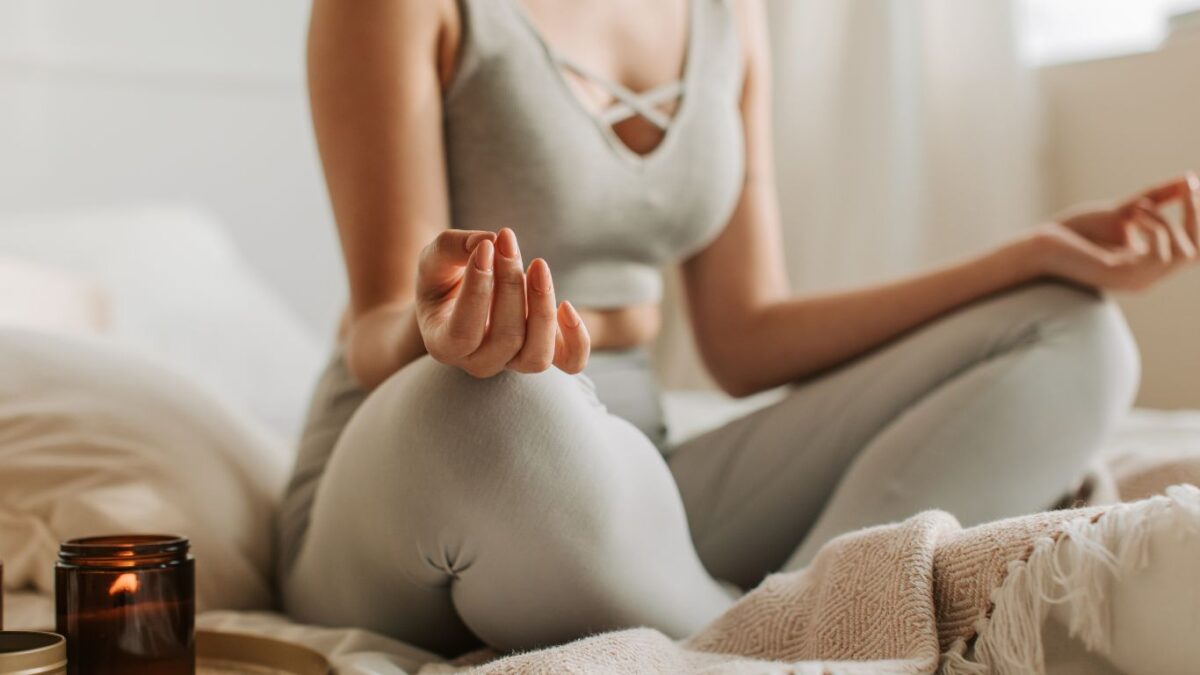These 7 Yoga Poses are Real Life Saver During Menopause

Yoga can be a real lifesaver during menopause. It’s not just about stretching and holding poses; it’s about creating a balance in the body that can genuinely help in easing those menopause symptoms.
In this blog, we’re going to break down seven yoga poses that can be your go-to during menopause. We’ll guide you through each one, step by step, so you can get the maximum benefit out of them. And don’t worry, we’ve got the why’s covered too – explaining why each pose can be a boon during menopause.
Whether you’re a yoga pro or just starting out, this guide is for you. It’s all about finding a bit of peace and comfort through yoga, even in the midst of menopause.
So, grab your yoga mat and let’s get started on this journey to a more balanced you during menopause.
1. Child’s Pose (Balasana)
This pose helps in calming the nervous system which is often frazzled due to hormonal fluctuations during menopause.
Instructions:
- Start on your hands and knees.
- Bring your big toes together and separate your knees wider than your hips.
- Exhale and lay your torso down between your thighs.
- Extend your arms in front of you, palms facing down.
- Hold the pose for 30 seconds to a few minutes.
Benefits:
- Reduces stress and anxiety.
- Stretches the hips, thighs, and ankles.
- Relieves back and neck pain.
2. Cat-Cow Pose (Marjaryasana-Bitilasana)
The fluid movement in this pose helps in reducing stiffness and can alleviate discomfort associated with menopause.
Instructions:
- Start on your hands and knees in a tabletop position.
- Inhale as you arch your back (Cow Pose), looking up.
- Exhale as you round your back (Cat Pose), tucking your chin to your chest.
- Repeat for 10-15 cycles.
Benefits:
- Improves flexibility and posture.
- Massages the spine and belly organs.
3. Bridge Pose (Setu Bandhasana)
This pose helps in reducing symptoms of menopause like hot flashes by improving circulation.
Instructions:
- Lie on your back with your knees bent and feet flat on the floor.
- Keep your arms beside your body, palms facing down.
- Inhale and lift your hips off the floor, pressing your feet and arms down.
- Hold for 15-30 seconds and release.
Benefits:
- Strengthens the legs and hips.
- Improves circulation.
4. Warrior II (Virabhadrasana II)
This pose builds strength and stability which can be beneficial as bone density decreases during menopause.
Instructions:
- Stand with your feet wide apart.
- Turn your right foot out and bend your right knee.
- Extend your arms to shoulder height, parallel to the floor.
- Gaze over your right hand.
- Hold for 30 seconds and repeat on the other side.
Benefits:
- Strengthens the legs and arms.
- Opens the hips and chest.
5. Tree Pose (Vrikshasana)
This pose helps enhance focus and concentration which can sometimes waver during menopause due to hormonal changes.
Instructions:
- Stand tall with your feet together.
- Shift your weight to your left foot and bring your right foot to your left inner thigh.
- Bring your hands to your heart or extend them overhead.
- Hold for 30 seconds and repeat on the other side.
Benefits:
- Improves balance and stability.
- Strengthens the legs.
6. Forward Bend (Uttanasana)
Instructions:
- Stand tall with your feet hip-width apart.
- Exhale and hinge at your hips to fold forward, bringing your hands towards the floor.
- Keep a slight bend in your knees to protect your lower back.
- Hold for 30 seconds to a minute.
Benefits:
- Stretches the spine and hamstrings.
- Calms the mind.
Why it’s good for menopause:
- Helps in reducing anxiety and mood swings associated with menopause.
7. Legs-Up-The-Wall Pose (Viparita Karani)
This restorative pose helps in reducing insomnia and other sleep issues common during menopause.
Instructions:
- Sit close to a wall and lie down on your back.
- Swing your legs up the wall, keeping your hips close to the wall.
- Extend your arms to the sides, palms facing up.
- Hold for 5-15 minutes.
Benefits:
- Relieves swollen ankles and varicose veins.
- Calms the nervous system.
For more detailed instructions and benefits, you can refer to the following sites:
